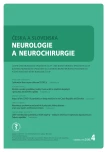Radial nerve injury associated with humeral shaft fracture
Authors:
R. Kaiser 1; M. Makeľ 2
Authors‘ workplace:
Neurochirurgická a neuroonkologická klinika 1. LF UK a ÚVN Praha
1; Klinika plastické chirurgie 3. LF UK a FN Královské Vinohrady, Praha
2
Published in:
Cesk Slov Neurol N 2020; 83/116(4): 353-359
Category:
Review Article
doi:
https://doi.org/10.14735/amcsnn2020353
Overview
Radial nerve palsy accompanies up to 20% of humeral shaft fractures. Two thirds of the findings occur in connection with the injury mechanism (primary palsy) and one third during conservative or surgical treatment (secondary, i.e., iatrogenic palsy). Although most of these injuries have a good prognosis and spontaneous return of function can be expected, there are situations where reinnervation cannot be achieved without surgical revision. These are lacerations or incarcerations of the nerve between bone fragments or severe traction lesions causing scarring and neuroma-in-continuity formation. Such serious findings are present in less than one half of the cases requiring surgical intervention. Early intervention has a higher success rate than conservative treatment (with possible late revision in case of persistence of denervation). Therefore, according to current literature data, early revision within 3 weeks is recommended in most cases of radial nerve palsy associated with humeral fracture with respect to the general condition of the patient, affected limb, mechanism of injury, and the results of complementary examinations.
Keywords:
radial nerve – humeral shaft fracture – nerve injury – traumatic neuroma
Sources
1. Chang G, Ilyas AM. Radial nerve palsy after humeral shaft fractures: the case for early exploration and a new classification to guide treatment and prognosis. Hand Clin 2018; 34 (1): 105–112. doi: 10.1016/j.hcl.2017.09.011.
2. Shao YC, Harwood P, Grotz MR et al. Radial nerve palsy associated with fractures of the shaft of the humerus: a systematic review. J Bone Joint Surg Br 2005; 87 (12): 1647–1652. doi: 10.1302/0301-620X.87B12.16132.
3. Ilyas AM, Mangan JJ, Graham J. Radial nerve palsy recovery with fractures of the humerus: an updated systematic review. J Am Acad of Orthop Surg 2020; 28 (6): e263–e269. doi: 10.5435/JAAOS-D-18-00142.
4. Streufert BD, Eaford I, Sellers TR et al. Iatrogenic nerve palsy occurs with anterior and posterior approaches for humeral shaft fixation. J Orthop Trauma 2020; 34 (3): 163–168. doi: 10.1097/BOT.0000000000001658.
5. Kaiser R. Chirurgie hlavových a periferních nervů s atlasem přístupů. Praha: Grada Publishing 2016.
6. Ljungquist KL, Martineau P, Allan C. Radial nerve injuries. J Hand Surg 2015; 40 (1): 166–172. doi: 10.1016/j.jhsa.2014.05.010.
7. Latef TJ, Bilal M, Vetter M et al. Injury of the radial nerve in the arm: a review. Cureus 2018; 10 (2): e2199. doi: 10.7759/cureus.2199.
8. Schwab TR, Stillhard PF, Schibli S et al. Radial nerve palsy in humeral shaft fractures with internal fixation: analysis of management and outcome. Eur J Traum Emerg Surg 2018; 44 (2): 235–243. doi: 10.1007/s00068-017- 0775-9.
9. O‘Shaughnessy MA, Parry JA, Liu H et al. Management of paediatric humeral shaft fractures and associated nerve palsy. J Child Orthop 2019; 13 (5): 508–515. doi: 10.1302/1863-2548.13.190012.
10. Ogawa BK, Kay RM, Choi PD et al. Complete division of the radial nerve associated with a closed fracture of the humeral shaft in a child. J Bone Joint Surg Br 2007; 89 (6): 821–824. doi: 10.1302/0301-620X.89B6.18942.
11. Bertelli J, Soldado F, Ghizoni MF. Outcomes of radial nerve grafting in children after distal humerus fracture. J Hand Surg 2018; 43 (12): 1140.e1–1140.e6. doi: 10.1016/j.jhsa.2018.04.018.
12. Rasulic L, Savic A, Vitosevic F et al. Iatrogenic peripheral nerve injuries-surgical treatment and outcome: 10 years‘ experience. World Neurosurg 2017; 103: 841–851. doi: 10.1016/j.wneu.2017.04.099.
13. Pratt N. Anatomy of nerve entrapment sites in the upper quarter. J Hand Therap 2005; 18 (2): 216–229. doi: 10.1197/j.jht.2005.02.004.
14. Kaiser R, Houšťava L, Haninec P. Surgical treatment of supinator canal syndrome. Cesk Slov Neurol N 2013; 76/109 (5): 619–622.
15. Kaiser R, Mencl L, Haninec P. Injuries associated with serious brachial plexus involvement in polytrauma among patients requiring surgical repair. Injury 2014; 45 (1): 223–226. doi: 10.1016/j.injury.2012.05. 013.
16. Esparza M, Wild JR, Minnock C et al. Ultrasound evaluation of radial nerve palsy associated with humeral shaft fractures to guide operative versus non-operative treatment. Acta Med Acad 2019; 48 (2): 183–192. doi: 10.5644/ama2006-124.257.
17. Deniel A, Causeret A, Moser T et al. Entrapment and traumatic neuropathies of the elbow and hand: an imaging approach. Diagn Interv Imag 2015; 96 (12): 1261–1278. doi: 10.1016/j.diii.2015.10.006.
18. Seddon H. Surgical disorders of the peripheral nerves. 2nd ed. London: Churchill Livingstone 1972.
19. Li Y, Ning G, Wu Q et al. Review of literature of radial nerve injuries associated with humeral fractures-an integrated management strategy. PloS One 2013; 8 (11): e78576. doi: 10.1371/journal.pone.0078576.
20. Kim DH, Kam AC, Chandika P et al. Surgical management and outcome in patients with radial nerve lesions. J Neurosurg 2001; 95 (4): 573–583. doi: 10.3171/jns.2001.95.4.0573.
21. Roganovic Z, Petkovic S. Missile severances of the radial nerve. Results of 131 repairs. Acta Neurochir 2004; 146 (11): 1185–1192. doi: 10.1007/s00701-004-0361-x.
22. Zvěřina E, Stejskal L. Poranění periferních nervů. Praha: Avicenum 1979.
23. Bertelli JA. Nerve versus tendon transfer for radial nerve paralysis reconstruction. J Hand Surg 2020; 45 (5): 418–426. doi: 10.1016/j.jhsa.2019.12.009.
24. Čižmář I, Ehler E, Pilný J et al. Léze radiálního nervu a možnosti pozdní rekonstrukce funkce šlachovým transferem. Cesk Slov Neurol N 2010; 73/106 (6): 701–705.
Labels
Paediatric neurology Neurosurgery NeurologyArticle was published in
Czech and Slovak Neurology and Neurosurgery

2020 Issue 4
Most read in this issue
- It is evident when to make a surgery for lumbar disc herniation?
- CGRP monoclonal antibodies in the treatment of migraine – indication criteria and therapeutic recommendations for the Czech Republic
- Current diagnostics of secondary progressive form of multiple sclerosis and its treatment with siponimod
- Cytotoxic lesions of the corpus callosum (CLOCCs)
